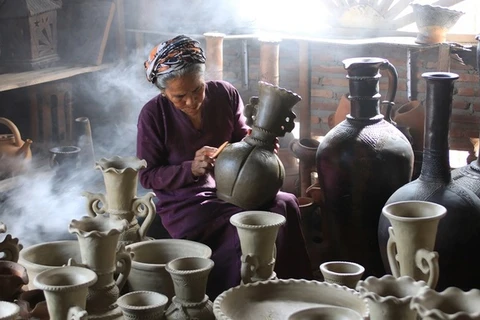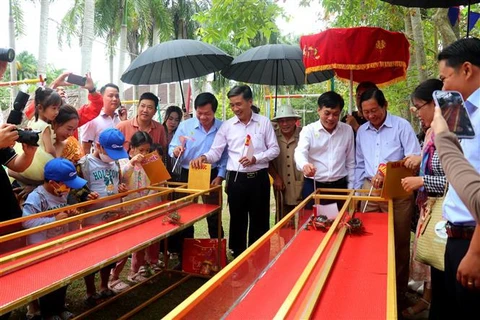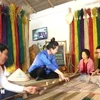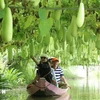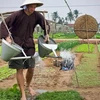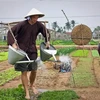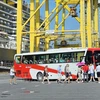Hanoi (VNA) – The community’s participation in tourism development not only helps maintain long-term economic contributions, but also ensures the necessary support for and supervision over tourism activities. Therefore, according to insiders, it is an effective solution to promote sustainable tourism.
Today, in addition to the need to visit the scenic spots, tourists also want to explore the indigenous culture and experience the daily life activities of local people. This would not be possible without the community’s involvement in tourism activities.
This is identified as the "key" to finding consensus between the community and stakeholders in making decisions on tourism development, thereby creating motivation for destinations to develop rapidly and sustainably. In addition, mobilising their participation in tourism development is also a solution to help create livelihoods; improve locals’ living conditions; raise their awareness on preserving the living environment, tourism resources and cultural identity; and enrich products in a positive way.
Being aware of the importance of community-based tourism development, in recent times, several localities and destinations have taken practical measures to encourage the community to engage in developing the non-smoke industry.
Deputy Director of the Department of Culture, Sports and Tourism of northern mountainous Son La province Tran Xuan Viet said since 2014, after the Prime Minister issued a decision approving the master plan for development of Moc Chau national tourist site to 2020, with a vision to 2030, the provincial People's Council has issued many specific resolutions with policies to support community-based tourism development.
People of Moc Chau and Van Ho districts have proactively implemented projects to develop community-based tourism hamlets by renovating housing premises, arranging and decorating rooms with traditional cultural features of ethnic groups, developing culinary services to ensure food hygiene and safety, and producing traditional agricultural products based on the application of clean production technology to serve sustainable tourism development. The People's Committees of the two districts also regularly organise training courses to improve vocational skills for tourism, guide the community on professional skills in promoting and marketing tourism products. As a result, Moc Chau has emerged as a bright spot in community tourism, Viet added.
As for the renowned resort township of Sa Pa in the northern mountainous province of Lao Cai, the township has prioritised budget resources for implementing projects to preserve and promote the cultural values of ethnic minorities in the locality.
However, according to experts, doing tourism activities in many places are still spontaneous, and lacking skills and experiences in organisation and operation, especially limited foreign language skills. Therefore, for community-based tourism to be successful, it is necessary to have investment policies for people, through improving the community’s skills and capacity apply learned knowledge scientifically and flexibly to serve tourists.
They said that the active participation of local people in tourism development is essential, because the local community is the determining factor in the cultural environment, lifestyle, and identity of the destination - important features that attract tourists. Therefore, to develop community-based tourism, preserving and promoting indigenous values is a decisive issue, they added./.
Today, in addition to the need to visit the scenic spots, tourists also want to explore the indigenous culture and experience the daily life activities of local people. This would not be possible without the community’s involvement in tourism activities.
This is identified as the "key" to finding consensus between the community and stakeholders in making decisions on tourism development, thereby creating motivation for destinations to develop rapidly and sustainably. In addition, mobilising their participation in tourism development is also a solution to help create livelihoods; improve locals’ living conditions; raise their awareness on preserving the living environment, tourism resources and cultural identity; and enrich products in a positive way.
Being aware of the importance of community-based tourism development, in recent times, several localities and destinations have taken practical measures to encourage the community to engage in developing the non-smoke industry.
Deputy Director of the Department of Culture, Sports and Tourism of northern mountainous Son La province Tran Xuan Viet said since 2014, after the Prime Minister issued a decision approving the master plan for development of Moc Chau national tourist site to 2020, with a vision to 2030, the provincial People's Council has issued many specific resolutions with policies to support community-based tourism development.
People of Moc Chau and Van Ho districts have proactively implemented projects to develop community-based tourism hamlets by renovating housing premises, arranging and decorating rooms with traditional cultural features of ethnic groups, developing culinary services to ensure food hygiene and safety, and producing traditional agricultural products based on the application of clean production technology to serve sustainable tourism development. The People's Committees of the two districts also regularly organise training courses to improve vocational skills for tourism, guide the community on professional skills in promoting and marketing tourism products. As a result, Moc Chau has emerged as a bright spot in community tourism, Viet added.
As for the renowned resort township of Sa Pa in the northern mountainous province of Lao Cai, the township has prioritised budget resources for implementing projects to preserve and promote the cultural values of ethnic minorities in the locality.
However, according to experts, doing tourism activities in many places are still spontaneous, and lacking skills and experiences in organisation and operation, especially limited foreign language skills. Therefore, for community-based tourism to be successful, it is necessary to have investment policies for people, through improving the community’s skills and capacity apply learned knowledge scientifically and flexibly to serve tourists.
They said that the active participation of local people in tourism development is essential, because the local community is the determining factor in the cultural environment, lifestyle, and identity of the destination - important features that attract tourists. Therefore, to develop community-based tourism, preserving and promoting indigenous values is a decisive issue, they added./.
VNA




